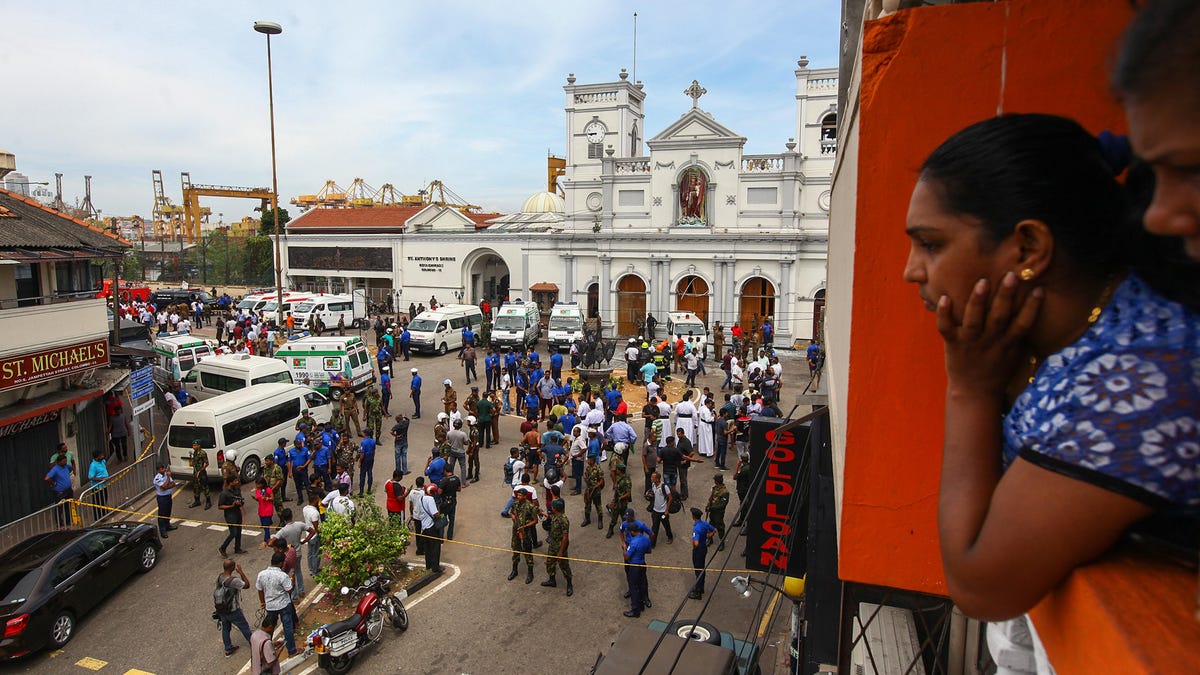Sri Lanka blocks social media after deadly Easter explosions
More than 200 people are reported killed, with hundreds more hospitalized following eight blasts at churches and hotels.

Sri Lankan forces secure the area around St. Anthony's Shrine after an explosion hit St Anthony's Church in Colombo on Easter Sunday.
Sri Lanka has temporarily shut down access to social media following multiple coordinated bombings on Easter Sunday that left scores dead and injured.
More than 200 people were killed and hundreds more hospitalized with injuries from eight blasts at Roman Catholic churches and high-end hotels, according to multiple reports. The attacks struck at around 8:45 a.m. local time. Sri Lankan Defense Minister Ruwan Wijewardene described the blasts as a terrorist incident and blamed religious extremists.
Seven suspects have been arrested, Sri Lankan Prime Minister Ranil Wickremesinghe told reporters Sunday night, though no one immediately claimed responsibility for the blasts. Wickremesinghe said he feared the violence could trigger instability in the small island nation at India's southern tip.
The government clamped down on social media to prevent the spread of misinformation following the attacks, the secretary to the president, Udaya Seneviratne, told The New York Times. "Please avoid propagating unverified reports and speculation," Wickremesinghe tweeted following the explosions.
I strongly condemn the cowardly attacks on our people today. I call upon all Sri Lankans during this tragic time to remain united and strong. Please avoid propagating unverified reports and speculation. The government is taking immediate steps to contain this situation.
— Ranil Wickremesinghe (@RW_UNP) April 21, 2019
Local Roshni Fernando tweeted, "If I don't reply to your messages it is because WhatsApp and Facebook appears to have been shut down in Sri Lanka." Fernando told The Washington Post she grew up in London but recently moved to Sri Lanka and lives in the capital, Colombo, one of the cities targeted in the attacks.
If I don’t reply to your messages it is because WhatsApp and Facebook appears to have been shutdown in Sri Lanka
— Boshers (@RoshniFernando) April 21, 2019
"People can now only communicate through SMS here, or Twitter I guess," Fernando said, adding that she was also unable to access YouTube and Instagram. Some users on social media said they were still able to communicate with friends and family on apps like Snapchat and WhatsApp.
The Sri Lankan government also imposed an immediate nationwide curfew from 6 p.m. to 6 a.m. following the blasts. "The government is taking immediate steps to contain this situation," the prime minister tweeted.
Condolences and condemnation poured in from political and religious leaders around the world Sunday. Pope Francis addressed the killings at the end of his traditional Easter Sunday blessing.
138 people have been killed in Sri Lanka, with more that 600 badly injured, in a terrorist attack on churches and hotels. The United States offers heartfelt condolences to the great people of Sri Lanka. We stand ready to help!
— Donald J. Trump (@realDonaldTrump) April 21, 2019
Absolutely horrific news from Sri Lanka. Canada strongly condemns the heinous attacks on Christians at churches and hotels. Our hearts & thoughts are with the families & loved ones of those killed and all those injured.
— Justin Trudeau (@JustinTrudeau) April 21, 2019
Strongly condemn the horrific terrorist attack in Sri Lanka on Easter Sunday resulting in precious lives lost & hundreds injured. My profound condolences go to our Sri Lankan brethren. Pakistan stands in complete solidarity with Sri Lanka in their hour of grief.
— Imran Khan (@ImranKhanPTI) April 21, 2019
"I want to express my loving closeness to the Christian community, targeted while they were gathered in prayer, and all the victims of such cruel violence," the pope said from the loggia of St. Peter's Basilica. "I entrust to the Lord all those who were tragically killed and pray for the injured and all those who are suffering as a result of this dramatic event."
New Zealand Prime Minister Jacinda Ardern condemned the "devastating" attacks and referred to the March 15 shootings at two mosques in the New Zealand city of Christchurch in which 50 died. After a gunman used Facebook to broadcast the deadly shooting, Facebook said it might limit who can stream live video.
CNET sister site CBSNews contributed to this report.
Originally published 5:31 a.m. PT.

